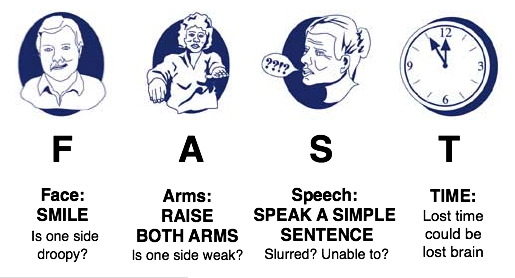Top 10 Stroke Signs You Should Know About

A stroke, or cerebrovascular accident (CVA), is a scary experience. It occurs when the blood supply to the brain is impeded or cut off completely due to lack of blood flow (or ischemia), blockage (thrombosis, arterial embolism), or a brain hemorrhage. As a result, the brains stops functioning normally and oftentimes the muscles in the body, the reflexes, and the senses are all affected.
Luckily, a stroke can be treated, but getting emergency medical attention as quickly as possible is the key to survival. That’s why it’s vital to recognise the following ten warning signs of a stroke…
Lack of Understanding
A person suffering a stroke will often have difficulty understanding certain statements and commands in the days leading up to the actual stroke.
Headache
The sudden onset of a severe, debilitating headache or migraine that is not normal or usual is common prior to a stroke. In fact, many stroke victims explain a headache so painful that it feels like being struck by lightning, causes extreme nausea, and even collapse.
Dizziness
Many victims of a stroke encounter a total loss of balance so severe that they feel like the world is spinning (i.e., vertigo).
Impaired Vision
Those affected by a stroke often explain there is a period prior where they have trouble seeing or seeing clearly. This blurred vision might only be temporary, but observers can test visual aptitude by asking the victim how many fingers they are holding up. If they can’t tell, call an abulance.
Facial Paralysis
Oftentimes a stroke inflicts the facial muscles, where one side of the face droops or goes totally numb so the face appears non symmetrical when they try to talk or smile.
Loss of Sensation
In the days leading up to a stroke, it’s common for a gradual, or even a total, loss of vibratory sensation (or feeling) on the skin. The other senses—such as smell, taste, and hearing can also be fully or partially affected.
Difficult Speech
If an individual suddenly has difficulty speaking or forming intelligent sentences, it can indicate a stroke. Observers often explain it as watching someone helpless trying to talk, or a look of sudden confusion on the affected person’s face.
Loss of Balance
The onset of a stroke will cause extreme physical turmoil, so much so that often victims have trouble walking, lose their balance and coordination completely, and even have trouble sitting down without falling.
Weakness
A sudden loss of strength in the muscles of the face, arm, leg—even if it’s just temporary—can signal an oncoming stroke. Many patients complain of numbness or tingling in the left arm or shoulder that comes on suddenly and gradually worsens. Sometimes, complete muscle failure can occur, where you can’t lift an arm or bear weight on the affected leg.
Lack of Reflex
It is also common to experience a decrease or loss of reflex. For instance, many stroke victims complain of trouble swallowing when eating to the point where they gag.





